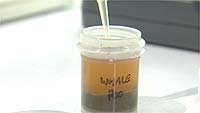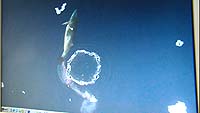Does Whale Poo Steam?


Pictures: A whale pooing and a sample of whale poo in the lab (both photos are taken by Australian researchers...curiously, all whale poo research is done by Australians...I'm just saying...)
“I have a question,” a second grade boy announces seriously at carpet time. “Does whale poo steam?” he poses to the group and to me specifically. A roar of chirpy laughter erupts in the amoebic ring of seated children. The tips of my ears are burning. This is why I really shouldn’t have started ‘the question of the day’, I think to myself.
“That is an interesting question, Lionel; I don’t think I have heard somebody ask that before. How did you think of that?” I ask, probingly. “Simple,” he replies, “my dog pooped in the snow on the way to school with me and my mom and my brother and Sarah, and it steamed”.
Logical, I think to myself. “And why do you think whale poo might steam?” I ask back. “I don’t know, but we are studying the Arctic and it is cold there and things might steam” Lionel supposes. “Like poo” says another little boy –more giggles from the children in the circle. “Ok, I have to be honest, I don’t know the answer to this question, but I will go home to research it this afternoon and I will tell you what I find out tomorrow”. Am I setting a dangerous precedent, I wonder?
Needless to say, there is surprisingly sparse data on the internet pertaining to whale poo in general, and to whether or not it steams, in particular. Apparently, whale poo is somewhat difficult for researchers to come across in the field, and specimens are quite highly cherished by marine biologists. Evidently, however, the consistency of faecal matter varies between species of whales; baleen whales have loose, watery discharge, whereas toothed whales have more solid waste that can (depending on composition) float to the surface. Consequently, I am inferring that if such a specimen were to be released from the warm body of the mammal and float up to the surface, it is marginally possible for it to steam once it reaches the cold Arctic air.
At carpet time the next day, I report my findings to the squirming amoeba shaped ring of children and to Lionel in particular. He sits quietly for a moment, deep in thought, and resolutely replies, “I thought so”.
In reflection of this occurrence during my teaching time, I realized that a seemingly puerile and inane question from a child is something that can be so easily dismissed with a laugh, or by a perplexed facial expression followed by the oft used phrase “ok, and moving on now…” spoken in a indifferent teacher voice. What message does it send to children when we do not value their questions, or bother to find out why they might be asking such a query? In other words, how often do educators fail to recognize the experiential knowledge of children as legitimate and worthy of investigation? When a more experienced teacher told me not to bother wasting my time at home because they won’t even remember the question the next day, I realized that this type of knowledge, children’s experiential knowledge is both undervalued and underrepresented in mainstream curricular discourse.


1 Comments:
*****FANTASTIC**** Blog Vanessa - keep writing - love it.
Also made me laugh... which is not so good cause my face still hurts from the opperation! Will post pics soon of the "funny" face I have now... swelling is going down. yay.
b
Post a Comment
<< Home